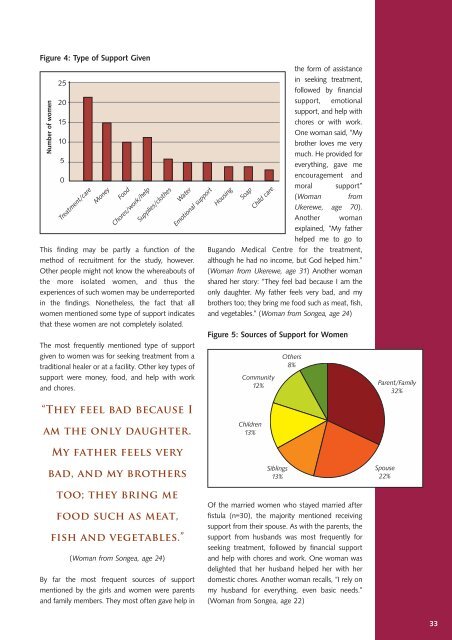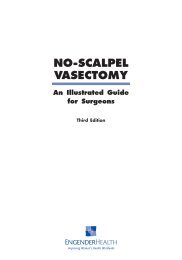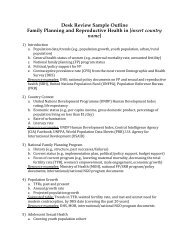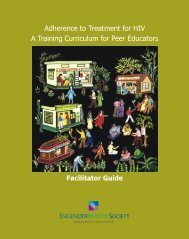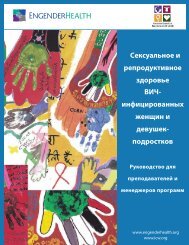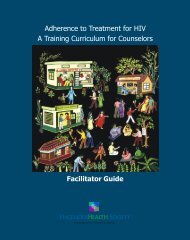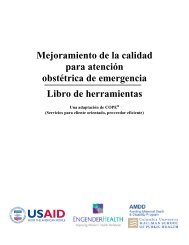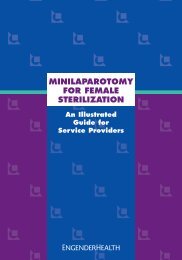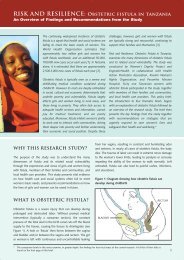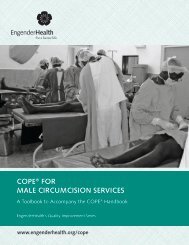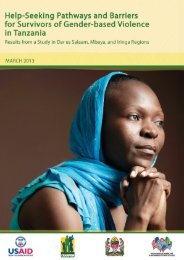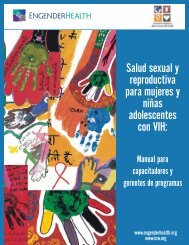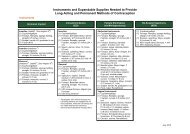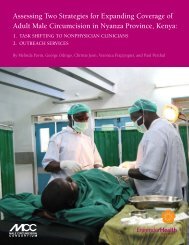Risk and Resilience: Obstetric Fistula in Tanzania - EngenderHealth
Risk and Resilience: Obstetric Fistula in Tanzania - EngenderHealth
Risk and Resilience: Obstetric Fistula in Tanzania - EngenderHealth
You also want an ePaper? Increase the reach of your titles
YUMPU automatically turns print PDFs into web optimized ePapers that Google loves.
Figure 4: Type of Support Given<br />
Number of women<br />
25<br />
20<br />
15<br />
10<br />
5<br />
0<br />
Treatment/care<br />
Money<br />
Food<br />
Chores/work/help<br />
Supplies/clothes<br />
Water<br />
Emotional support<br />
This f<strong>in</strong>d<strong>in</strong>g may be partly a function of the<br />
method of recruitment for the study, however.<br />
Other people might not know the whereabouts of<br />
the more isolated women, <strong>and</strong> thus the<br />
experiences of such women may be underreported<br />
<strong>in</strong> the f<strong>in</strong>d<strong>in</strong>gs. Nonetheless, the fact that all<br />
women mentioned some type of support <strong>in</strong>dicates<br />
that these women are not completely isolated.<br />
The most frequently mentioned type of support<br />
given to women was for seek<strong>in</strong>g treatment from a<br />
traditional healer or at a facility. Other key types of<br />
support were money, food, <strong>and</strong> help with work<br />
<strong>and</strong> chores.<br />
the form of assistance<br />
<strong>in</strong> seek<strong>in</strong>g treatment,<br />
followed by f<strong>in</strong>ancial<br />
support, emotional<br />
support, <strong>and</strong> help with<br />
chores or with work.<br />
One woman said, “My<br />
brother loves me very<br />
much. He provided for<br />
everyth<strong>in</strong>g, gave me<br />
encouragement <strong>and</strong><br />
moral support”<br />
(Woman from<br />
Ukerewe, age 70).<br />
Another woman<br />
expla<strong>in</strong>ed, “My father<br />
helped me to go to<br />
Bug<strong>and</strong>o Medical Centre for the treatment,<br />
although he had no <strong>in</strong>come, but God helped him.”<br />
(Woman from Ukerewe, age 31) Another woman<br />
shared her story: “They feel bad because I am the<br />
only daughter. My father feels very bad, <strong>and</strong> my<br />
brothers too; they br<strong>in</strong>g me food such as meat, fish,<br />
<strong>and</strong> vegetables.” (Woman from Songea, age 24)<br />
Hous<strong>in</strong>g<br />
Soap<br />
Child care<br />
Figure 5: Sources of Support for Women<br />
Community<br />
12%<br />
Others<br />
8%<br />
Parent/Family<br />
32%<br />
“They feel bad because I<br />
am the only daughter.<br />
Children<br />
13%<br />
My father feels very<br />
bad, <strong>and</strong> my brothers<br />
too; they br<strong>in</strong>g me<br />
food such as meat,<br />
fish <strong>and</strong> vegetables.”<br />
(Woman from Songea, age 24)<br />
By far the most frequent sources of support<br />
mentioned by the girls <strong>and</strong> women were parents<br />
<strong>and</strong> family members. They most often gave help <strong>in</strong><br />
Sibl<strong>in</strong>gs<br />
13%<br />
Of the married women who stayed married after<br />
fistula (n=30), the majority mentioned receiv<strong>in</strong>g<br />
support from their spouse. As with the parents, the<br />
support from husb<strong>and</strong>s was most frequently for<br />
seek<strong>in</strong>g treatment, followed by f<strong>in</strong>ancial support<br />
<strong>and</strong> help with chores <strong>and</strong> work. One woman was<br />
delighted that her husb<strong>and</strong> helped her with her<br />
domestic chores. Another woman recalls, “I rely on<br />
my husb<strong>and</strong> for everyth<strong>in</strong>g, even basic needs.”<br />
(Woman from Songea, age 22)<br />
Spouse<br />
22%<br />
33


